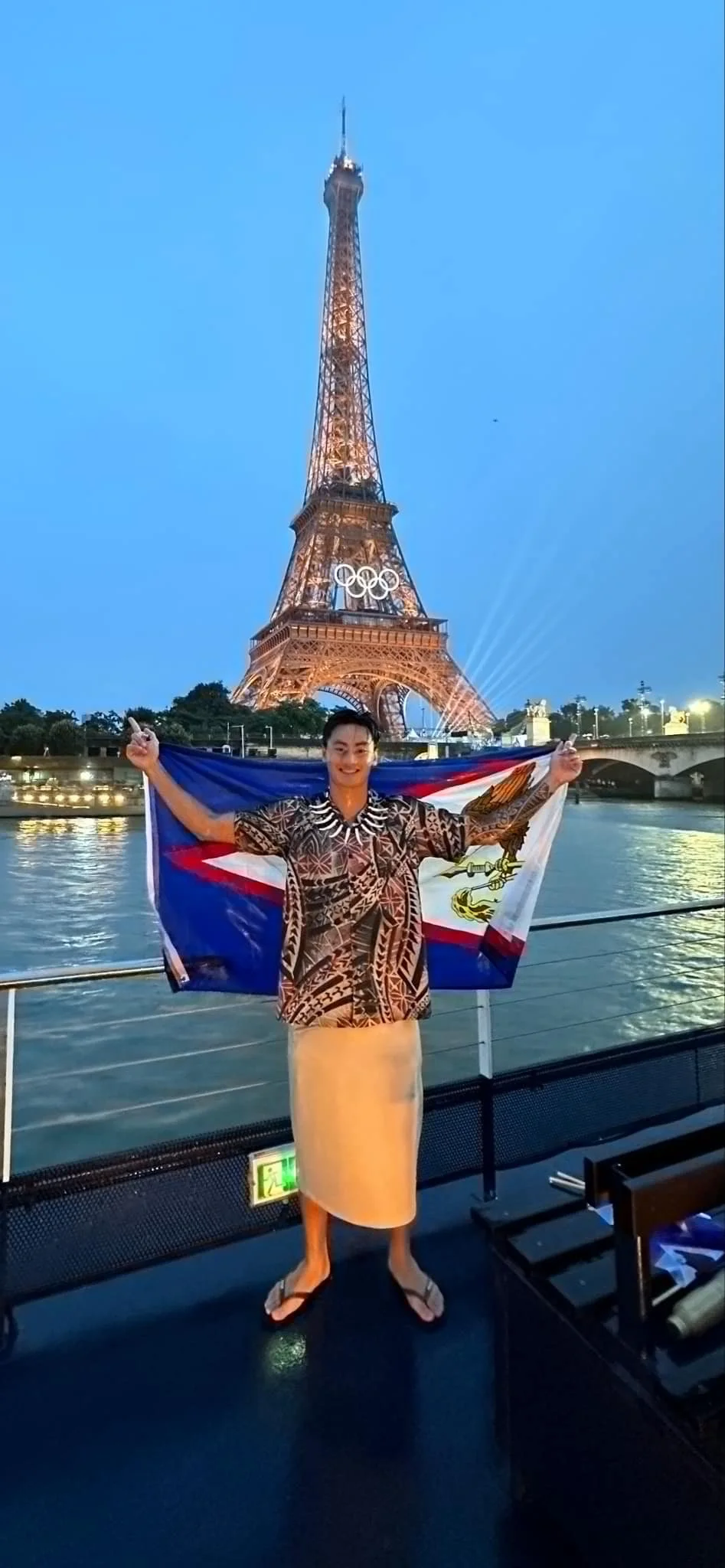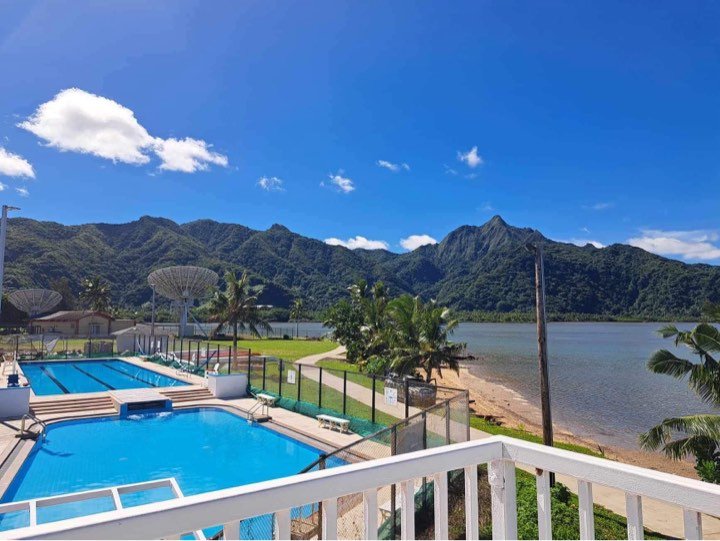PARIS – Swim competition at these Paris 2024 Games got underway at 11:02 Saturday morning. By 11:38, Micah Masei, representing America Samoa, was done, his Olympics over just that quickly, 34th of 35 in the men’s 100-meter breaststroke, second to last.
Masei knew coming in that this, or something very much like this, would be the drill.
Most swimmers do not take part in the opening ceremony. He did. Through the pouring rain. To take part in what International Olympic Committee president Thomas Bach declared to the assembled athletes would be the “pinnacle of [their] Olympic journey.”
Micah Masei in front of the Eiffel Tower // ASSA
Which, in the case of Micah Masei and literally thousands of others of those taking part in these Paris Games, is absolutely the fundamental truth.
Because for most here the Olympics are not about winning.
The Olympics are about hopes and dreams.
As Bach said Friday night as the rain came down, drawing on John Lennon: “Some may say, we in the Olympic world, we are dreamers …
“So, I invite everybody: dream with us … let us celebrate this Olympic spirit of living life in peace, as the one and only humankind, united in all our diversity.”
It can be wildly unpopular to relay these figures but this, too, is the truth:
There are more than 11,000 athletes here from more than 200 entities. In all, there are 329 medal events at the Paris Games. To round off the math, let’s say one in 10 wins a medal. That means the vast majority, like Micah Masei, are here for -- what?
“It’s not about the swim itself, in my eyes,” he said.
What, then?
Certainly, revel in the moment, but more so in the journey—the grind, what it took to get here, and the moments along the way.
It's also very much about family.
And about living the notions of friendship, camaraderie and, especially, gratitude.
For the opportunity, even if it lasts for but just about 66 seconds on a rainy Saturday morning in Paris, to just be here.
And, in Masei’s case, to shine a light on a place – seven dots in the Pacific Ocean a long way southwest of even Hawaii – and to hope that one day someone else can, like him, stand on the starting blocks and swim at an Olympic Games for American Samoa.
“I am going to be done after this,” he said. “I have had these whispers. My goal would be to have someone else take it on. To have people from American Samoa see this and say, ‘I can swim.’”
American Samoa is represented at these Paris Games by two, exactly two, athletes – Micah Masei, 25, and track and field sprinter Filomenaleonisa Iakopo, 18, who will be attending Baylor in the fall.
Politically, American Samoa is a United States territory. It lies to the east of the international date line. Samoa, a different entity, is to the west.
In the world of the Olympics, American Samoa gets to be one of 206 national Olympic committees – separate and distinct from the U.S. Olympic & Paralympic Committee.
USA Swimming has literally thousands of members. The American Samoa Swimming Association, per president Erika Radewagen, who by the way is a volunteer, has “maybe 20.”
America Samoa has its own area code, not country code – 684. In all, about 45,000 people live on the seven islands of American Samoa. The capital: Pago Pago, population 3,600, give or take.
“I don’t want to sound super-cliché or anything,” Masei said, “but I would love to try to put American Samoa on the map. A lot of people don’t really know where it is. If you have representation, it always begs the question – what flag is that, where are they from?”
In 2019, a community pool opened in Pago Pago with three 25-meter lanes. No starting blocks.
The community pool in Pago Pago // ASSA
Olympic races are held in a pool 50 meters long.
To dream of Paris from Pago Pago?
It can be done. It just takes – some doing.
Micah Masei is now, in fact, a two-time Olympian.
He swam in Tokyo, again in the 100 breast, 46th of 47 … second to last.
But to even get there, because of Covid, he had to prepare not in a pool but in the Pacific Ocean, in the waters off Oahu. “I don’t know if I could train effectively in the ocean,” he said. “But it was something. Better than nothing.
“I want to emphasize: I was grateful for what I had. In other parts of the world, people don’t have a pool. For them, this might be normal. Even if it might be a step down from what I might have been used to, be grateful for it.”
Masei was in Hawaii for college. He grew up in Oregon. His dad, Bill, 53, is a noted high school football and track and field coach in the state. His grandfather, Mataiaau, 82, born in the American Samoa village of Faga’alu, south of Pago Pago, had come to the mainland and worked in a foundry, making metal brake drums.
It’s through his grandfather that Micah Masei swims for American Samoa.
“We lived with grandpa for quite a while in the same house,” Micah Masei said. “That’s the case for a lot of families.”
After Tokyo, Micah Masei took time off from swimming.
In January 2023, he called Radewagen and said, I’m thinking of coming back. Let’s give it a month.
She was, to say the least, a little surprised. Most Olympic athletes are one-timers. But, as she put it, “I have swimmers who want to swim. If they’re willing to do it to get there, I’m willing to do my part.”
After those 30 days, he said, “I was like, I just need to do it.”
It’s perhaps an even question which for Masei was more challenging – preparing for Tokyo, given no pool, or for Paris, working full time and swimming on the side.
And, for the record – Micah Masei racked up some real success on the way to Paris.
His Tokyo swim, 1:04.93, was an American Samoa record.
At last November’s Pacific Games in the Solomon Islands, he took bronze in the 100 breast, in 1:05.8.
Then, this past April, at the Oceania championships on Australia’s Gold Coast, he won silver, lowering the American Samoa record to 1:04.64.
Reality check here, because, you know.
Britain’s Adam Peaty holds the 100 breast world record, 56.88 seconds. In Tokyo, Peaty won the race, in 57.37. During the heats, when Masei touched in 1:04.93, Peaty recorded the fastest time, 57.56.
So – more than seven seconds faster.
On Saturday, Holland’s Caspar Corbeau had the fastest heat time, 59.04, Peaty 14-hundredths back in 59.18.
The time sheets will show Micah Masei 6.91 seconds behind Corbeau.
Masei in his lane immediately at the end of his race Saturday morning
Mataiaau Masei watching his grandson earlier this year at the Oceania championships // photo courtesy Bill Masei
Whatever.
Masei had taken part in Friday night’s opening ceremony. He and Iakopo, as the only two entrants from American Samoa, were naturally the male and female flagbearers. In the Paris 2024 order, ‘Samoa’ and ‘American Samoa’ were put next to each other in the parade of nations.
The ceremony went late. Masei got up early. He raced his race.
Swimming seeds athletes according to how officials think they are likely to perform. Micah Masei was in the very first heat, along with athletes from Mozambique, Laos and Eswatini (you might know it by its former name, Swaziland).
Whatever.
In a championship men’s nighttime race, there are eight guys in the pool. Note: four in this morning heat.
Whatever.
“We’re extremely proud of him for [racing] and being the ambassador for American Samoa and swimming,” his dad said.
For the Tokyo Games, Mataiaau Masei, wearing an American Samoa shirt, made sure no matter the hour to watch his grandson swim. Since, said Bill Masei, Mataiaau has moved to a memory facility. The plan back home – since the race happened at 2:30 in the morning in Oregon – was to record it and play it when everyone could gather round at a decent hour, Bill Masei said.
“It definitely helps to know he’s willing to support because,” Micah Masei said of his grandfather, “I’m also doing this for him.”
He also said, clutching a towel after the race, reflective, “Me, definitely from a young age as a swimmer, I have hoped and dreamed to compete at this highest level. Day in and day out.
“That’s why we put in this work, every single day, every week.
“And I would say swimming at the Olympics is the peak of my dreams. It is the top goal I set for myself.
“And I’m beyond grateful.”





